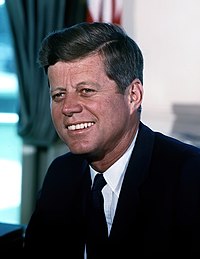
John F. Kennedy%2C White House color photo portrait.
(Image by Wikipedia (commons.wikimedia.org), Author: Cecil Stoughton, White House) Details Source DMCA
President Anderson, members of the faculty, board of trustees, distinguished guests, my old colleague, Senator Bob Byrd, who has earned his degree through many years of attending night law school, while I am earning mine in the next 30 minutes, distinguished guests, ladies and gentlemen.
It is with great pride that I participate in this ceremony of the American University, sponsored by the Methodist Church, founded by Bishop John Fletcher Hurst, and first opened by President Woodrow Wilson in 1914.
This is a young and growing university, but it has already fulfilled Bishop Hurst's enlightened hope for the study of history and public affairs in a city devoted to the making of history and to the conduct of the public's business. By sponsoring this institution of higher learning for all who wish to learn, whatever their color or their creed, the Methodists of this area and the Nation deserve the Nation's thanks, and I commend all those who are today graduating.
Professor Woodrow Wilson once said that every man sent out from a university should be a man of his nation as well as a man of his time, and I am confident that the men and women who carry the honor of graduating from this institution will continue to give from their lives, from their talents, a high measure of public service and public support.
"There are few earthly things more beautiful than a university," wrote John Masefield in his tribute to English universities and his words are equally true today. He did not refer to towers, or the campuses. He admired the splendid beauty of a university, because it was, he said, "a place where those who hate ignorance may strive to know, where those who perceive truth may strive to make others see."
I have, therefore, chosen this time and this place to discuss a topic on which ignorance too often abounds and the truth too rarely perceived - and that is the most important topic on earth: Peace.
What kind of a peace do I mean? What kind of a peace do we seek? Not a Pax Americana enforced on the world by American weapons of war. Not the peace of the grave or the security of the slave. I am talking about genuine peace, the kind of peace that makes life on earth worth living, the kind that enables men and nations to grow and to hope and build a better life for their children not merely peace for Americans but peace for all men and women not merely peace in our time but peace for all time.
I speak of peace because of the new face of war. Total war makes no sense in an age where great powers can maintain large and relatively invulnerable nuclear forces and refuse to surrender without resort to those forces. It makes no sense in an age when a single nuclear weapon contains almost ten times the explosive force delivered by all the allied air forces in the Second World War.
It makes no sense in an age when the deadly poisons produced by a nuclear exchange would be carried by wind and water and soil and seed to the far corners of the globe and to generations yet unborn.
Today the expenditure of billions of dollars every year on weapons acquired for the purpose of making sure we never need them is essential to the keeping of peace. But surely the acquisition of such idle stockpiles which can only destroy and never create is not the only, much less the most efficient, means of assuring peace.
I speak of peace, therefore, as the necessary rational end of rational men. I realize that the pursuit of peace is not as dramatic as the pursuit of war and frequently the words of the pursuer fall on deaf ears. But we have no more urgent task.
Some say that it is useless to speak of peace or world law or world disarmament and that it will be useless until the leaders of the Soviet Union adopt a more enlightened attitude. I hope they do. I believe we can help them do it.
But I also believe that we must reexamine our own attitude as individuals and as a Nation for our attitude is as essential as theirs. And every graduate of this school, every thoughtful citizen who despairs of war and wishes to bring peace, should begin by looking inward by examining his own attitude toward the possibilities of peace, toward the Soviet Union, toward the course of the Cold War and toward freedom and peace here at home.
(Note: You can view every article as one long page if you sign up as an Advocate Member, or higher).





